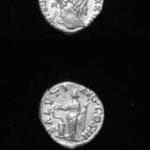Silver Denarius of Emperor Marcus Aurelius, 161 CE - 180 CE
Silver
C.8104
Further images
Obverse: M ANTONINVS AVG TR P XXIIII; Laureate Bust of the Emperor Facing Righ Reverse: SALVTI AVG COS III; Salus Standing to the Left, Holding a Sceptre and Feeding from...
Obverse: M ANTONINVS AVG TR P XXIIII; Laureate Bust of the Emperor Facing Righ
Reverse: SALVTI AVG COS III; Salus Standing to the Left, Holding a Sceptre and Feeding from a Patera a Snake Coiled around an Altar
Marcus Aurelius Antoninus was the Emperor of Rome from 161 until his death in 180 A.D. Born Marcus Annius Verus, he was adopted by the emperor Antoninus Pius in 138, and married his daughter Annia Galeria Faustina a few years later. He succeeded to the throne without difficulty on Antoninus' death. Marcus Aurelius was educated by the best tutors in Rome and was a devotee of Stoicism. However, he felt with more religious fervor the communion of man in the unity of the universe than most other Stoics. In his later years, he wrote the Meditations as a relief from his lonely office, in which he attempts to reconcile his Stoic philosophy of virtue and self-sacrifice with his role as emperor.
How many hands have touched a coin in your pocket or purse? What eras and lands have the coin traversed on its journey into our possession? As we reach into our pockets to pull out some change, we rarely hesitate to think of who might have touched the coin before us, or where the coin will venture to after it leaves our hands. More than money, coins are a symbol of the state that struck them, of a specific time and location, whether contemporary currencies or artifacts of long forgotten empires. This stunning hand-struck coin reveals an expertise of craftsmanship and intricate sculptural detail that is often lacking in contemporary machine-made currencies. Although Marcus Aurelius’ Meditations is considered among the most important books in history, his legacy extends beyond the written word. The philosophical leader Marcus Aurelius lives on in artifacts like this coin: concrete remnants of ancient empires passed from the hands of civilization to civilization, from generation to generation that appear as vibrant today as the day they were struck.
Reverse: SALVTI AVG COS III; Salus Standing to the Left, Holding a Sceptre and Feeding from a Patera a Snake Coiled around an Altar
Marcus Aurelius Antoninus was the Emperor of Rome from 161 until his death in 180 A.D. Born Marcus Annius Verus, he was adopted by the emperor Antoninus Pius in 138, and married his daughter Annia Galeria Faustina a few years later. He succeeded to the throne without difficulty on Antoninus' death. Marcus Aurelius was educated by the best tutors in Rome and was a devotee of Stoicism. However, he felt with more religious fervor the communion of man in the unity of the universe than most other Stoics. In his later years, he wrote the Meditations as a relief from his lonely office, in which he attempts to reconcile his Stoic philosophy of virtue and self-sacrifice with his role as emperor.
How many hands have touched a coin in your pocket or purse? What eras and lands have the coin traversed on its journey into our possession? As we reach into our pockets to pull out some change, we rarely hesitate to think of who might have touched the coin before us, or where the coin will venture to after it leaves our hands. More than money, coins are a symbol of the state that struck them, of a specific time and location, whether contemporary currencies or artifacts of long forgotten empires. This stunning hand-struck coin reveals an expertise of craftsmanship and intricate sculptural detail that is often lacking in contemporary machine-made currencies. Although Marcus Aurelius’ Meditations is considered among the most important books in history, his legacy extends beyond the written word. The philosophical leader Marcus Aurelius lives on in artifacts like this coin: concrete remnants of ancient empires passed from the hands of civilization to civilization, from generation to generation that appear as vibrant today as the day they were struck.





